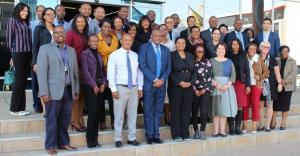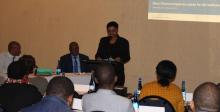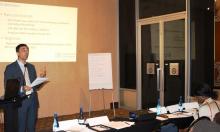“Non nocere!” (Do No Harm) - Preventing And Addressing Medication Errors
Gaborone, Botswana - 26 June 2018: “Non nocere!” (do no harm) is the indispensable principle of the healthcare profession. Safety of clinical care is one of the pillars supporting the efficiency and resilience of national healthcare systems. It greatly contributes to ensuring desirable health outcomes and supports public health programmes for delivering effective preventive and treatment services. Failure to achieve required quality is to a large extend associated with medication errors, as two-thirds of the hospital admissions attributed to medication errors are perceived to be avoidable1. Preventing and appropriately addressing medication errors including drug reactions, medicine-medicine interactions, lack of efficacy, suboptimal patient adherence and poor quality of life and patient experience is a global priority. One of the effective strategies for identifying and taking action for the majority of these challenges is pharmacovigilance (PV). PV is defined as the science and activities relating to the detection, assessment, understanding and prevention of adverse effects or any other drug-related problem.”2
The World Health Organization supports the Ministry of Health and Welness in strengthening national PV system through a series of technical interventions aiming at improving safety signal detection, analysis and adopting actions necessary to guarantee individual and public health. In the framework of these activities, experts from WHO headquarters, AFRO and the country office deliver a training workshop to physicians, pharmacists and nurses from the MoHW- HQ, the major hospitals and the Botswana Medicines Regulation Authority to build capacity in clinical, organizational, surveillance and assessment aspects.
Opening the training workshop, Dr Khumo Seipone, Director of Health Services of the Botswana Ministry of Health and Wellness underlined the importance and timeliness of the technical support as new medical products are being introduced into the healthcare system. “Clinical use of cutting-edge treatments including dolutegravir requires robust Pharmacovigilance and post-marketing surveillance system, which will build on the existing marketing authorization procedures to stand guard over the safety throughout the whole lifecycle of medicines”.
The workshop was organized as a 4-day event, which, coupled with the strengthened PV infrastructure and reporting pathways, it is expected to boost regulatory environment to ensure that the people of Botswana have access to safe and efficacious medicines.
_______________________________
1http://apps.who.int/iris/bitstream/handle/10665/252274/9789241511643-en…
2http://www.who.int/medicines/areas/quality_safety/safety_efficacy/pharm…


